cancer support
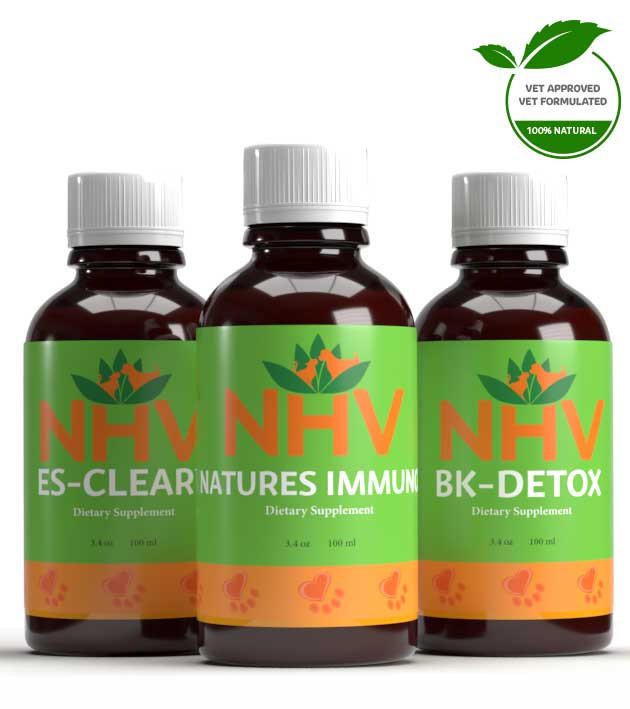
free shipping over $100 (USA & Canada)
1-877-937-4372 the pet expert hotline
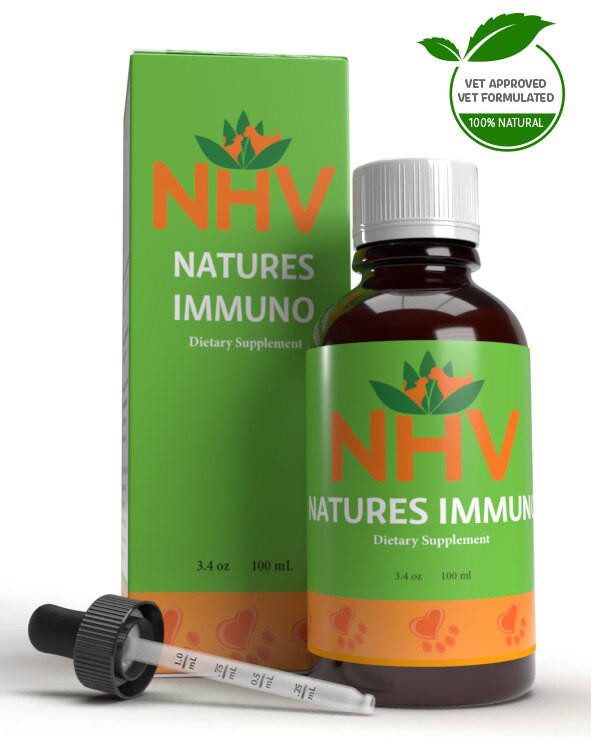
Vet-Formulated Supplement of Medicinal Mushrooms for Dogs

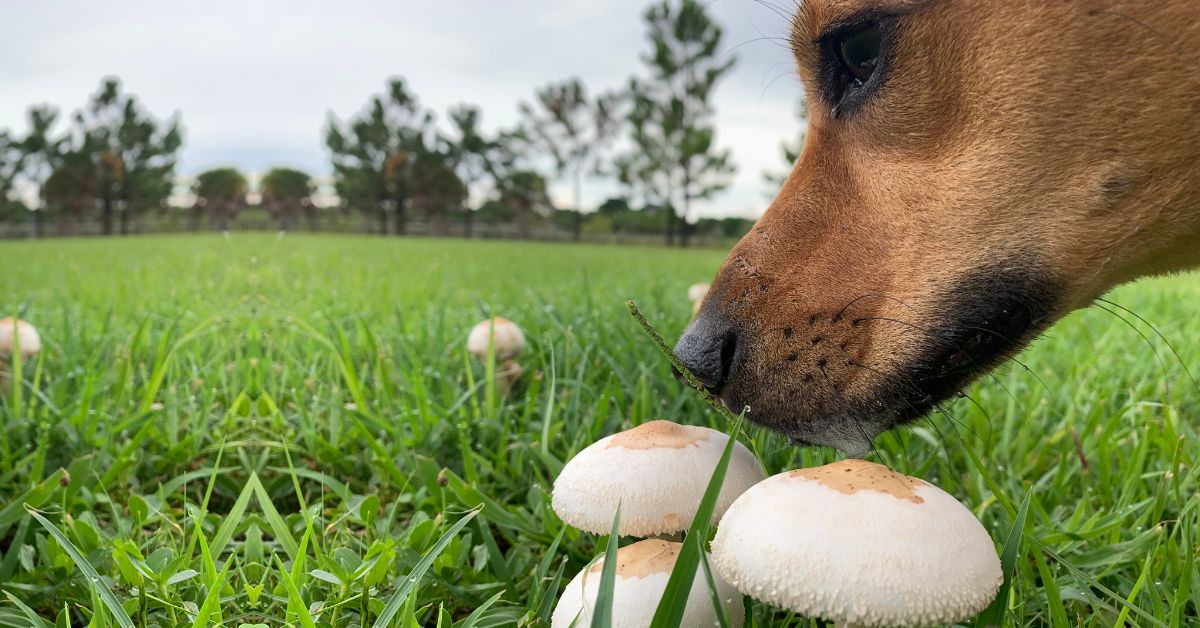
As we cozy up to fall – the fungi season – you might wonder, “Can dogs eat mushrooms?”
We’re afraid there isn’t an easy answer to this question. While many mushrooms, like the ones in our supplements, are safe in the proper dosage, a few can be highly toxic. So, before you and your little one venture out into the wild, learning about the different fungi types is essential, especially in the times of the year when they can be seen everywhere!
Can dogs eat mushrooms? Fungi are readily available in the fall or spring and can be dangerous to our curious furriends.
Fungi flourish in humid areas. In some parts of the world, fall can be just as damp as spring, creating the ideal conditions for mushrooms to thrive. These fungi can commonly be found in wooded or grassy areas, rocky landscapes, and even right in your own backyard.
The fact that these mushrooms are readily available can be dangerous to our curious furriends. Since they explore so much of the world with their mouths, they might end up ingesting poisonous fungi or even eating safe ones, but in a toxic amount.
Keep your furkiddo safe on any walks during the autumn by staying away from toxic mushrooms. These are the most common concerns poisonous species of fungi might cause:
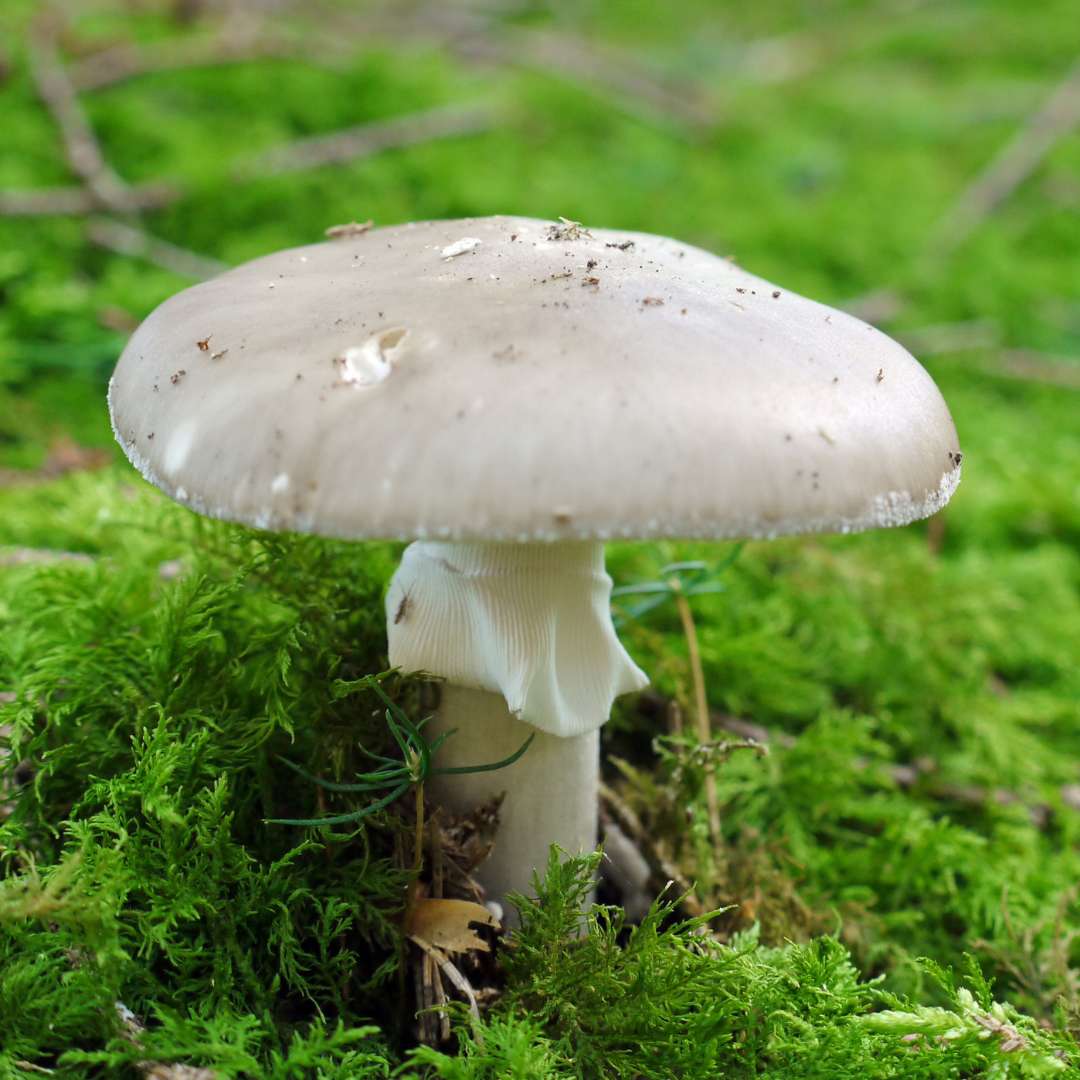
Liver Damage: Amanita phalloides (Death Cap Mushroom), Amanita ocreata (Angel of Death), Lepiota (False Parasol), and Galerina
These are fatal fungi that contain hepatotoxicity. They can be spotted in mossy or forested areas after heavy rain.
Hallucinations: Conocybe, Gymnopilus, Psilocybe and Panaeolus
These fungi are rarely fatal but can cause short-term weakness, disorientation, unusual behaviors, and seizures in pets.
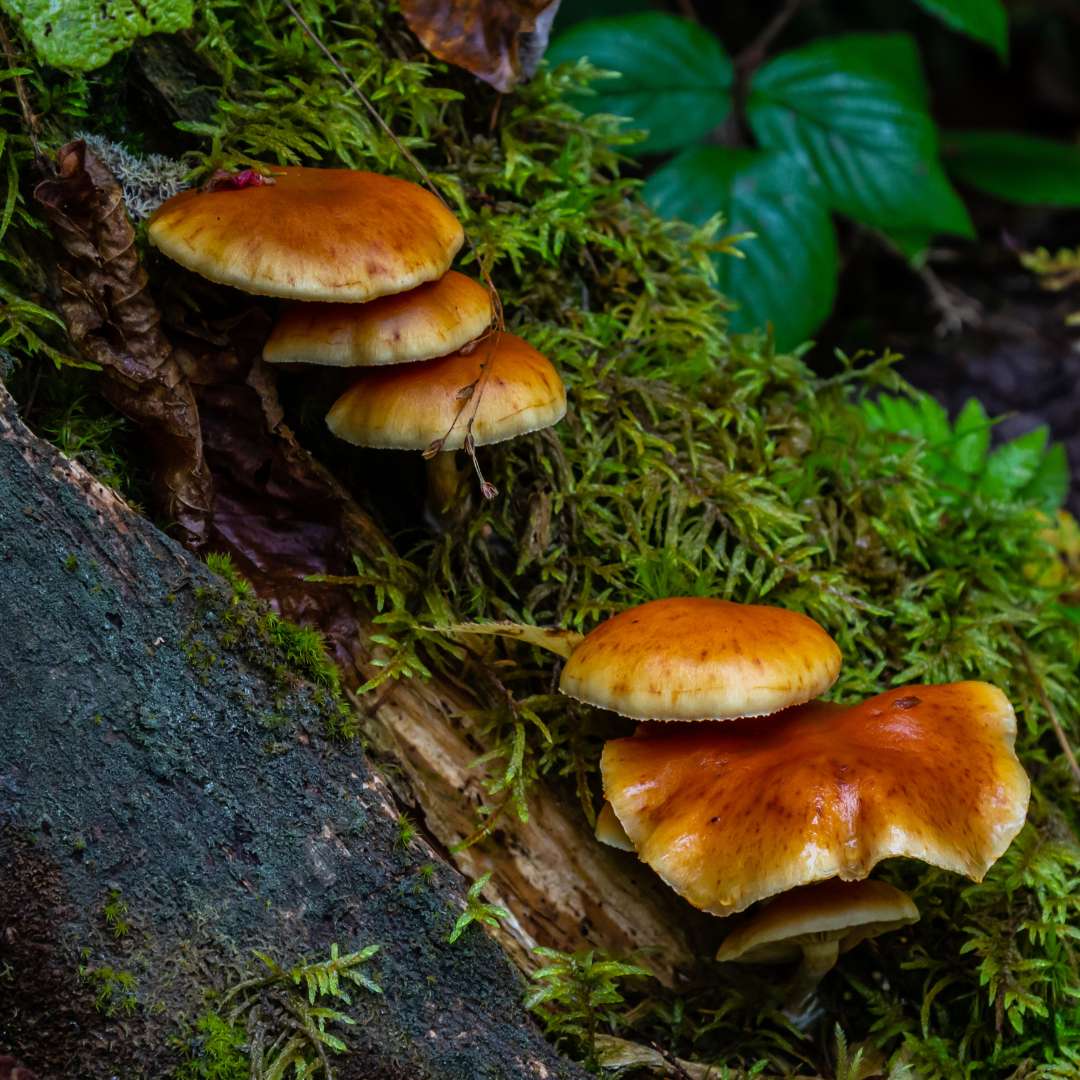
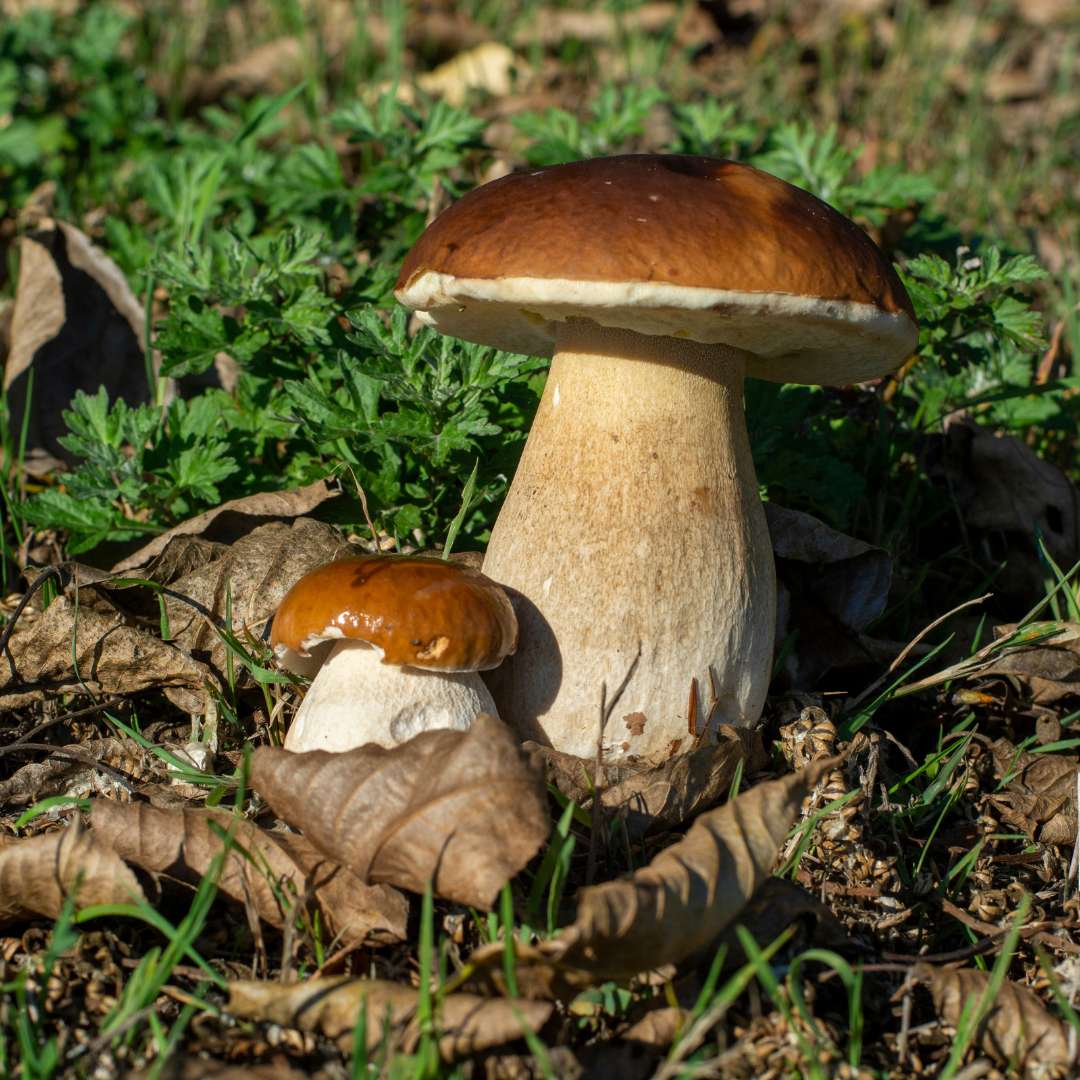
Stomach Issues: Boletus, Chlorophyllum, and Entoloma
Even though these species are the least toxic, they can still cause an upset stomach in your little one. Symptoms like vomiting and diarrhea may result within an hour of ingestion.
The above are just a few examples of toxic fungi. There are still a plethora of mushrooms that could cause harm to your little one. Not to mention all the furkiddos out there that could be allergic to different types of mushrooms, causing uncomfortable symptoms if ingesting them. That is why answering the question “can dogs eat mushroom?” is not that easy.
Identifying and distinguishing the different mushrooms is also a challenging feat. That is why we strongly advise assuming every fungus in the wild or your yard is poisonous until proven otherwise. So please regularly check the grass around your house for mushrooms and remove them for extra caution.
However, there are safe mushrooms and many that are, in fact, beneficial for your furkiddo’s health. Holistic veterinarians can use a variety of mushrooms for their medicinal active components, such as polysaccharides, proteins, and glycoproteins. These natural ingredients are widely utilized in the correct dosage in supplements with anti-cancer, anti-inflammatory, and immune-balancing properties.
The safest way to take advantage of the medicinal properties of fungi, but also the cautions these ingredients demand, is by opting for pet-specific mushroom blends. All our supplements are vet-formulated with the right dosage in mind, ensuring that they are completely safe for your little one to take. Our holistic vet and master herbalist responsible for designing over 36 blends have included mushrooms in two of our supplements, NHV Natures Immuno and NHV Lesstress.
Natures Immuno, is a blend of five mushrooms that were carefully selected for their ability to help pets dealing with cancer. They are:
Together, these medicinal mushrooms work to help strengthen the compromised immune system of sick pets, help address cancer symptoms, and can be used alongside chemotherapy for added support.
Lesstress on the other hand, is our main canine calming formula, beneficial for stress, anxiety, and other nervous system issues. This supplement includes Reishi mushrooms for their ability to help manage high blood pressure, which may be brought on by stress and anxiety. Reishi is also known to be a smooth muscle relaxant and may help restore immune health affected by stress.
Even though a few mushrooms can be very dangerous, most can do wonders for our furry friends’ health! Next time you wonder “can dogs eat mushrooms”? please remember to do your research about toxic species and avoid any wild fungi when enjoying the great outdoors in the fall and spring. If you are looking to add mushroom-based supplements to your little one’s regimen, opt for vet-formulated versions and consider the correct dosage according to your furkiddo’s weight. If you have any questions, feel free to connect with us! Your little one’s health and safety is our priority.
cancer support

ES Clear, Natures Immuno & BK-Detox
bundle and save with pet expert kits
3 month supply for a small to medium size pet
Cancer may sound scary but it doesn’t necessarily mean a death sentence for your pet. Surgery, chemotherapy, and nutrient therapy can all be used to maintain and improve their quality of life. Our Pet Cancer Immunity Plus Kit is formulated to provide your pet that extra support so they can keep fighting!


Cancer may sound scary but it doesn’t necessarily mean a death sentence for your pet. Surgery, chemotherapy, and nutrient therapy can all be used to maintain and improve their quality of life. Our Pet Cancer Immunity Plus Kit is formulated to provide your pet that extra support so they can keep fighting!

Cancer is an umbrella term for diseases that lead to the development of abnormal cells that destroy normal tissue. There are over 100 types of cancers in pets. There are no known causes for cancer, however, diet, environmental factors, age, and genetics all play key roles in how disease develops in the body.
Who wants to hear that their pet has cancer? It may be a serious diagnosis but it is not the end of the road! If caught early, and with a lot of love and care, your pet may have a lot of life still to live! Our Pet Cancer Immunity Plus Kit which contains ES-Clear, Natures Immuno, and BK-Detox can be used for proactive pet care as well as be helpful for cancer and more severe conditions where their immune system may be severely weakened. NHV supplements are formulated to be used alongside conventional veterinary treatments and chemotherapy to support gentle detoxification as well as add extra immune support.
When your pet is diagnosed with cancer, their lymphatic system and immune system may become weakened from chemo or other vet-prescribed cancer drugs. Our Pet Cancer Immunity Plus Kit is formulated to address the areas of the body affected by cancer and degenerative disease. This bundle contains ES-Clear, Natures Immuno, and BK-Detox.
ES-Clear is our leading cancer support for pets. Herbs like burdock and Chinese rhubarb help detoxify the liver and other vital organs. And ingredients like Sheep's sorrel and slippery elm are highly beneficial for their nutritional qualities and stimulating immune cell function. Natures Immuno's blend of medicinal mushrooms helps enhance the effects of chemotherapy and at the same time gently supports and helps to rebuild the immune system. It encourages the body's natural defenses against chronic infections, autoimmune disorders, and more. Shitake mushrooms contain vital nutrients that support effective immune functioning and help to boost white blood cell production. Mushrooms like Reishi and Agaricus are being used in combination with chemotherapy by oncologists in Japan and China to fight cancer in humans. Turkey Tail and Cordyceps mushrooms are widely studied for their anti-tumor properties. With herbs like cleavers and prickly ash, BK-Detox helps flush the entire lymphatic system of metabolic wastes (especially areas of the body with scar tissue or swelling. Its blend of detoxifying herbs encourages the body to cleanse, detoxify, and build new blood cells.
With NHV Supplements, you can give your furry friend the extra support they need to help repair their immune system and help them keep fighting! All of our care products are created with 100% organic and wildcrafted ingredients and can be use safely alongside chemotherapy. If you have any questions about cancer or holistic remedies, Get in touch with an NHV Pet Expert - we’re here to support you every step of the way!
Made with the finest, organically grown, or ethically harvested herbs. Made specifically for pets, vet-formulated and vet approved.
Select your pet's weight to determine the correct dose.
To be taken twice daily. Determine your pet’s weight and then use the easy chart below to determine the correct dose. This is the minimum dosage.
Pet's Weight Dosage
0 - 15 lb = 0.5 ml
16 - 30 lb = 1.0 ml
31 - 45 lb = 1.5 ml
46 - 60 lb = 2.0 ml
61 - 75 lb = 2.5 ml
Over 75 lb = 3.0 ml
For small animals (rabbits, ferrets), avians and reptiles use 1 drop for every 2 lb of body weight.
How to Administer
Shake well before use. The easiest method is to use the dropper provided and place the drops into your pet’s food or favorite treat. You can also use the dropper and squirt directly into the pet’s mouth. Some pets can be finicky, if this occurs consider hiding the drops in foods most pet’s love such as fish, chicken or yogurt or a favorite treat. If your pet only eats dry food then soak a few kibbles at feeding time.
For Best Results
Herbal dietary supplements are beneficial to the health and well-being of your pet and are safe for long-term use. Every pet responds to natural herbal supplements differently, therefore it is important to be consistent and administer the product daily. Supplements generally take two to four weeks to take effect, however this will vary from one animal to the next.
Product Storage
All NHV Natural Pet Products are pure herbal extracts and contain no artificial additives, preservatives or coloring. Shelf life after opening is 6 months and must be refrigerated after opening.
All information provided by NHV Natural Pet Products is for educational purposes only.
Cancer is an umbrella term for diseases that lead to the development of abnormal cells that destroy normal tissue. There are over 100 types of cancers in pets. There are no known causes for cancer, however, diet, environmental factors, age, and genetics all play key roles in how disease develops in the body.
Who wants to hear that their pet has cancer? It may be a serious diagnosis but it is not the end of the road! If caught early, and with a lot of love and care, your pet may have a lot of life still to live! Our Pet Cancer Immunity Plus Kit which contains ES-Clear, Natures Immuno, and BK-Detox can be used for proactive pet care as well as be helpful for cancer and more severe conditions where their immune system may be severely weakened. NHV supplements are formulated to be used alongside conventional veterinary treatments and chemotherapy to support gentle detoxification as well as add extra immune support.
When your pet is diagnosed with cancer, their lymphatic system and immune system may become weakened from chemo or other vet-prescribed cancer drugs. Our Pet Cancer Immunity Plus Kit is formulated to address the areas of the body affected by cancer and degenerative disease. This bundle contains ES-Clear, Natures Immuno, and BK-Detox.
ES-Clear is our leading cancer support for pets. Herbs like burdock and Chinese rhubarb help detoxify the liver and other vital organs. And ingredients like Sheep's sorrel and slippery elm are highly beneficial for their nutritional qualities and stimulating immune cell function. Natures Immuno's blend of medicinal mushrooms helps enhance the effects of chemotherapy and at the same time gently supports and helps to rebuild the immune system. It encourages the body's natural defenses against chronic infections, autoimmune disorders, and more. Shitake mushrooms contain vital nutrients that support effective immune functioning and help to boost white blood cell production. Mushrooms like Reishi and Agaricus are being used in combination with chemotherapy by oncologists in Japan and China to fight cancer in humans. Turkey Tail and Cordyceps mushrooms are widely studied for their anti-tumor properties. With herbs like cleavers and prickly ash, BK-Detox helps flush the entire lymphatic system of metabolic wastes (especially areas of the body with scar tissue or swelling. Its blend of detoxifying herbs encourages the body to cleanse, detoxify, and build new blood cells.
With NHV Supplements, you can give your furry friend the extra support they need to help repair their immune system and help them keep fighting! All of our care products are created with 100% organic and wildcrafted ingredients and can be use safely alongside chemotherapy. If you have any questions about cancer or holistic remedies, Get in touch with an NHV Pet Expert - we’re here to support you every step of the way!
Made with the finest, organically grown, or ethically harvested herbs. Made specifically for pets, vet-formulated and vet approved.
Select your pet's weight to determine the correct dose.
To be taken twice daily. Determine your pet’s weight and then use the easy chart below to determine the correct dose. This is the minimum dosage.
Pet's Weight Dosage
0 - 15 lb = 0.5 ml
16 - 30 lb = 1.0 ml
31 - 45 lb = 1.5 ml
46 - 60 lb = 2.0 ml
61 - 75 lb = 2.5 ml
Over 75 lb = 3.0 ml
For small animals (rabbits, ferrets), avians and reptiles use 1 drop for every 2 lb of body weight.
How to Administer
Shake well before use. The easiest method is to use the dropper provided and place the drops into your pet’s food or favorite treat. You can also use the dropper and squirt directly into the pet’s mouth. Some pets can be finicky, if this occurs consider hiding the drops in foods most pet’s love such as fish, chicken or yogurt or a favorite treat. If your pet only eats dry food then soak a few kibbles at feeding time.
For Best Results
Herbal dietary supplements are beneficial to the health and well-being of your pet and are safe for long-term use. Every pet responds to natural herbal supplements differently, therefore it is important to be consistent and administer the product daily. Supplements generally take two to four weeks to take effect, however this will vary from one animal to the next.
Product Storage
All NHV Natural Pet Products are pure herbal extracts and contain no artificial additives, preservatives or coloring. Shelf life after opening is 6 months and must be refrigerated after opening.
All information provided by NHV Natural Pet Products is for educational purposes only.
stress & anxiety support
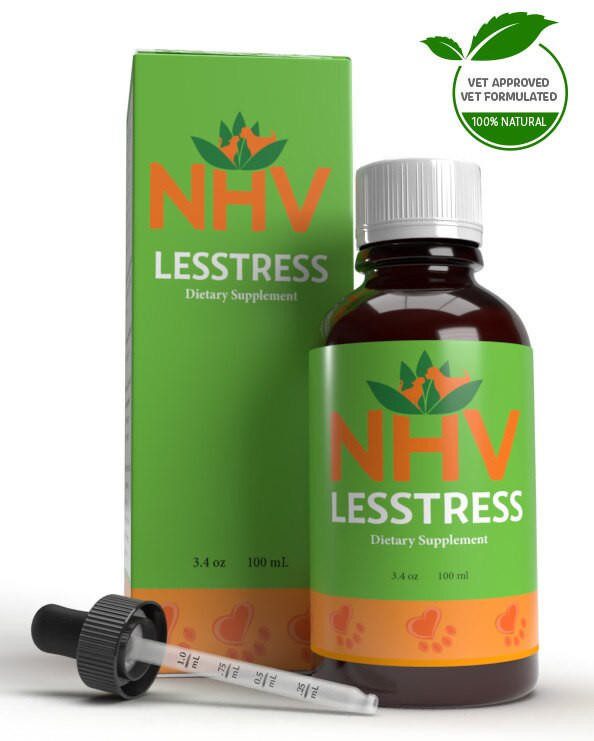
Natural Support for Canine Stress and Anxiety
buy 2 and save $3
3 month supply for a small to medium size pet
Everyone knows what stress feels like, and we all know that too much stress can make us ill—high blood pressure, ulcers and even cancer can result from excessive stress. Like us, dogs can get stressed by numerous factors as well. Help your furkiddo relax into a long and happy life with NHV Lesstress - a natural dog stress support.

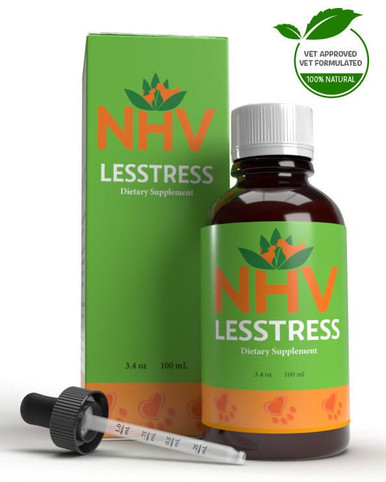
Everyone knows what stress feels like, and we all know that too much stress can make us ill—high blood pressure, ulcers and even cancer can result from excessive stress. Like us, dogs can get stressed by numerous factors as well. Help your furkiddo relax into a long and happy life with NHV Lesstress - a natural dog stress support.

Natural Dog Stress Reliever Supplemental Support
With a heightened sense of hearing and smell, small events that seem mundane to us can be terrifying and stressful for your dogs. Sometimes the stress is from the ride to the office, or maybe they are missing their human companions. This all contributes to changes in behavior like excessive panting, drooling, sweaty paws, dilated eyes, pacing, excessively shedding, or just completely shutting down. Some dogs become so stressed that it may lead to fear and aggression.
Other forms of stress in a dog’s life include:
In addition to panting, excessive barking/whining, chewing on themselves, shivering (when it’s not cold), panicked tail wagging, or tense muscles, stress can also cause GI tract issues such as diarrhea or vomiting.
The key to a healthy pup is balance. Too much or too little activity can be harmful, as well as too much or too little socialization. A balanced, clean diet also helps maintain the body and the mind. If your dog is susceptible to stress, you can use calming herbs like those found in NHV Lesstress. This formulation gently acts on the nervous system and immune system to provide a natural dog stress reliever.
How NHV’s Natural Dog Stress Relief Eases Stress and Anxiety
For stressful experiences such as separation anxiety, the loss or addition of a furry friend, special events (eg. fireworks) and illness (stress can cause conditions to worsen), the natural (non-addictive) sedative properties of Lesstress gently relax the nervous system and endocrine system. Ingredients like Chamomile, Passion Flower and Lemon Balm work to calm nerves while ingredients like Reishi, Eleuthero, and Echinacea Angustifolia are very beneficial for helping the body adapt to stress and illness and stimulate healthy immune function.
Help Support Your Dog Naturally
All NHV supplements like Lesstress are 100% natural and created by a holistic veterinarian and a master herbalist, specially formulated for pets. Feel free to contact our veterinary professionals to get more insight into your little one’s health and wellbeing.
Made with the finest, organically grown, or ethically harvested herbs. Made specifically for pets, vet-formulated and vet approved.
Lesstress for Dogs
Select your pet's weight to determine the correct dose.
To be taken twice daily. Determine your pet’s weight and then use the easy chart below to determine the correct dose. This is the minimum dosage.
Pet's Weight Dosage
0 - 15 lb = 0.5 ml
16 - 30 lb = 1.0 ml
31 - 45 lb = 1.5 ml
46 - 60 lb = 2.0 ml
61 - 75 lb = 2.5 ml
Over 75 lb = 3.0 ml
For small animals (rabbits, ferrets), avians and reptiles use 1 drop for every 2 lb of body weight.
How to Administer
Shake well before use.
The easiest method is to use the dropper provide and places the drops into your pet’s food or favorite treat. You can also use the dropper and squirt directly into the pet’s mouth.
Some pets can be finicky, if this occurs consider hiding the drops in foods most pet’s love such as fish, chicken or yogurt or a favourite treat. If your pet only eats dry food then soak a few kibbles at feeding time.
For Best Results
Herbal dietary supplements are beneficial to the health and wellbeing of your pet and are safe for long-term use. Every pet responds to natural herbal supplements differently, therefore it is important to be consistent and administer the product daily. Supplements generally take two to four weeks to take effect, however this will vary from one animal to the next.
Product Storage
All NHV Natural Pet Products are pure herbal extracts and contain no artificial additives, preservatives or coloring. Shelf life after opening is 6 months and must be refrigerated after opening.
Cautions and Contraindications
Do not use Lesstress in pregnant or nursing animals.
Speak to your vet before using our products. A second visit is recommended if your pet’s condition does not improve, or deteriorates after continued use of the supplements.
All information provided by NHV Natural Pet Products is for educational purposes only.
Natural Dog Stress Reliever Supplemental Support
With a heightened sense of hearing and smell, small events that seem mundane to us can be terrifying and stressful for your dogs. Sometimes the stress is from the ride to the office, or maybe they are missing their human companions. This all contributes to changes in behavior like excessive panting, drooling, sweaty paws, dilated eyes, pacing, excessively shedding, or just completely shutting down. Some dogs become so stressed that it may lead to fear and aggression.
Other forms of stress in a dog’s life include:
In addition to panting, excessive barking/whining, chewing on themselves, shivering (when it’s not cold), panicked tail wagging, or tense muscles, stress can also cause GI tract issues such as diarrhea or vomiting.
The key to a healthy pup is balance. Too much or too little activity can be harmful, as well as too much or too little socialization. A balanced, clean diet also helps maintain the body and the mind. If your dog is susceptible to stress, you can use calming herbs like those found in NHV Lesstress. This formulation gently acts on the nervous system and immune system to provide a natural dog stress reliever.
How NHV’s Natural Dog Stress Relief Eases Stress and Anxiety
For stressful experiences such as separation anxiety, the loss or addition of a furry friend, special events (eg. fireworks) and illness (stress can cause conditions to worsen), the natural (non-addictive) sedative properties of Lesstress gently relax the nervous system and endocrine system. Ingredients like Chamomile, Passion Flower and Lemon Balm work to calm nerves while ingredients like Reishi, Eleuthero, and Echinacea Angustifolia are very beneficial for helping the body adapt to stress and illness and stimulate healthy immune function.
Help Support Your Dog Naturally
All NHV supplements like Lesstress are 100% natural and created by a holistic veterinarian and a master herbalist, specially formulated for pets. Feel free to contact our veterinary professionals to get more insight into your little one’s health and wellbeing.
Made with the finest, organically grown, or ethically harvested herbs. Made specifically for pets, vet-formulated and vet approved.
Lesstress for Dogs
Select your pet's weight to determine the correct dose.
To be taken twice daily. Determine your pet’s weight and then use the easy chart below to determine the correct dose. This is the minimum dosage.
Pet's Weight Dosage
0 - 15 lb = 0.5 ml
16 - 30 lb = 1.0 ml
31 - 45 lb = 1.5 ml
46 - 60 lb = 2.0 ml
61 - 75 lb = 2.5 ml
Over 75 lb = 3.0 ml
For small animals (rabbits, ferrets), avians and reptiles use 1 drop for every 2 lb of body weight.
How to Administer
Shake well before use.
The easiest method is to use the dropper provide and places the drops into your pet’s food or favorite treat. You can also use the dropper and squirt directly into the pet’s mouth.
Some pets can be finicky, if this occurs consider hiding the drops in foods most pet’s love such as fish, chicken or yogurt or a favourite treat. If your pet only eats dry food then soak a few kibbles at feeding time.
For Best Results
Herbal dietary supplements are beneficial to the health and wellbeing of your pet and are safe for long-term use. Every pet responds to natural herbal supplements differently, therefore it is important to be consistent and administer the product daily. Supplements generally take two to four weeks to take effect, however this will vary from one animal to the next.
Product Storage
All NHV Natural Pet Products are pure herbal extracts and contain no artificial additives, preservatives or coloring. Shelf life after opening is 6 months and must be refrigerated after opening.
Cautions and Contraindications
Do not use Lesstress in pregnant or nursing animals.
Speak to your vet before using our products. A second visit is recommended if your pet’s condition does not improve, or deteriorates after continued use of the supplements.
All information provided by NHV Natural Pet Products is for educational purposes only.
cancer support
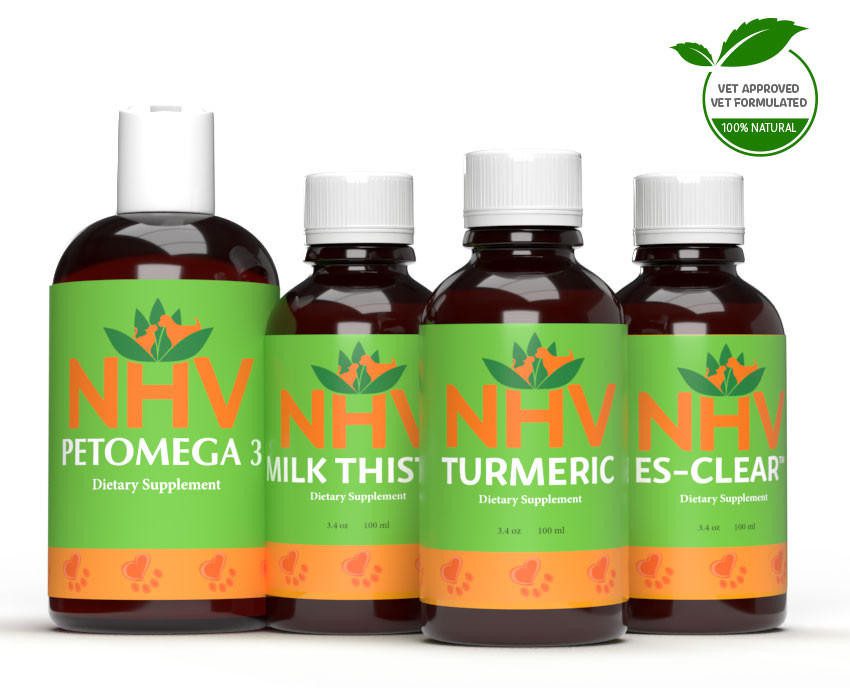
PetOmega 3, Milk Thistle, ES-Clear, Turmeric
bundle and save with pet expert kits
3 month supply for a small to medium size pet.
A full range of natural veterinarian-formulated herbal remedies designed to help your cat or dog manage the symptoms of cancer, boost immune function, improve energy, help scavenge free radicals. Use these supplements for cat and dog cancer care to improve their quality of life.

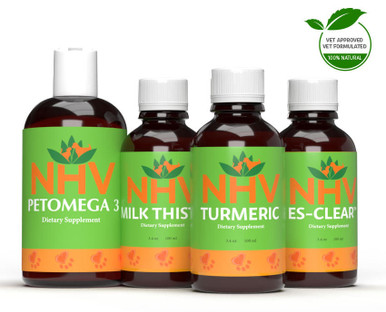
A full range of natural veterinarian-formulated herbal remedies designed to help your cat or dog manage the symptoms of cancer, boost immune function, improve energy, help scavenge free radicals. Use these supplements for cat and dog cancer care to improve their quality of life.

No pet parent wants to find out their pet has cancer, but not all forms of cancer are terminal. If caught early, the chances of recovery are drastically improved. In later cancer stages, the right support can provide a better quality of life for your pet. Using an integrative approach, which incorporates veterinarian-prescribed cancer treatments for pets as well as holistic and nutritional care can give your pet the best chance at fighting cancer.
Cancer occurs when abnormal cells start reproducing and eventually taking over the normal functioning cells, often uniting to form a mass or tumor in the process. Some tumors are benign (non-cancerous) but some are malignant (cancerous), and those tend to spread through the bloodstream or lymph nodes.
Cancer care for dogs and cats is critical, and at NHV, we have a wide range of holistic, natural vet-approved remedies that provide safe support to be given along with a vet-recommended treatment plan.
The cancer fighter pack contains four powerful human-grade quality products:
All of our products are third-party tested to guarantee quality and concentration with no additives or preservatives. Read our blog on how NHV’s cancer care for cat Ziggy helped him get back to his cat-hletic self.
If you have questions on the holistic approach to cancer care for dogs or cats, you can schedule a consultation because, at NHV, the health and wellbeing of your pet is our top priority.
ES Clear
Burdock – Traditionally used to eliminate toxins from the bloodstream, remove waste through urine output and a nutritive liver tonic. Used in oncology for fighting cancer due to the belief that the properties in the herbs may stop cancer cells from metastasizing. Burdock is eaten as a vegetable in Europe and Asia. Studies show the root to be high in antioxidant properties, which are beneficial in scavenging free radicals and supporting the immune system. Burdock has prebiotic properties that could improve health and digestion.
Sheep’s Sorrel – Used for hundreds of years in North America to fight cancer and support liver purification. Sheep’s Sorrel is high in vitamins and minerals and is considered to be a good source of antioxidants, which may increase the production of white blood cells and T-cells.
Slippery Elm – Helps eliminate toxins and waste by lubricating the digestive tract. High in nutrition values, used to help with irritation of the intestines and stomach. Slippery Elm is used as food in North America.
Chinese Rhubarb – Traditionally used to improve appetite and stimulate digestion. Helps the body rid itself of waste products and cleanse the bowels.
MILK THISTLE – has numerous benefits to the body; In addition to its detoxifying and anti-inflammatory properties, it is high in antioxidants. The bioflavonoid antioxidants help to increase the body’s immunity and slow down oxidative stress.
TURMERIC- The active compound of turmeric is Curcumin. Turmeric contains strong antioxidant properties and help scavenge free radicals.
NHV PETOMEGA 3 - A source of Omega 3 fatty acids derived from fish. PetOmega 3 contains vitamin A, D and E. Research has found that adding omega 3 may help the effectiveness of cancer therapies.
Select your pet's weight to determine the correct dose.
DOSAGE FOR PETOMEGA 3. To be taken once per day. Add to food based on weight chart.
Pet’s Weight Dosage
0-15 lb = ¼ tsp
15-30 lb = ½ tsp
30-60 lb = 1 tsp
60-90 lb = 1 ½ tsp
DOSAGE FOR: MILK THISTLE, ES CLEAR, TURMERIC:
To be taken twice daily. Determine your pet’s weight and then use the easy chart below to determine the correct dose. This is the minimum dosage.
Pet's Weight Dosage
0 - 15 lb = 0.5 ml
16 - 30 lb = 1.0 ml
31 - 45 lb = 1.5 ml
46 - 60 lb = 2.0 ml
61 - 75 lb = 2.5 ml
Over 75 lb = 3.0 ml
For small animals (rabbits, ferrets), avians and reptiles use 1 drop for every 2 lb of body weight.
How to Administer
Shake well before use. The easiest method is to use the dropper provide and places the drops into your pet’s food or favorite treat. You can also use the dropper and squirt directly into the pet’s mouth.
Some pets can be finicky, if this occurs consider hiding the drops in foods most pet’s love such as fish, chicken or yogurt or a favorite treat. If your pet only eats dry food then soak a few kibbles at feeding time.
For Best Results
Herbal dietary supplements are beneficial to the health and wellbeing of your pet and are safe for long-term use. Every pet responds to natural herbal supplements differently, therefore it is important to be consistent and administer the product daily. Supplements generally take two to four weeks to take effect, however this will vary from one animal to the next.
Product Storage
All NHV Natural Pet Products are pure herbal extracts and contain no artificial additives, preservatives or coloring. Shelf life after opening is 6 months and must be refrigerated after opening.
Cautions and Contraindications - MILK THISTLE, ES CLEAR
Do not use in pregnant or nursing animals. Speak to your vet before using our products. A second visit is recommended if your pet’s condition does not improve, or deteriorates after continued use of the supplements.
No pet parent wants to find out their pet has cancer, but not all forms of cancer are terminal. If caught early, the chances of recovery are drastically improved. In later cancer stages, the right support can provide a better quality of life for your pet. Using an integrative approach, which incorporates veterinarian-prescribed cancer treatments for pets as well as holistic and nutritional care can give your pet the best chance at fighting cancer.
Cancer occurs when abnormal cells start reproducing and eventually taking over the normal functioning cells, often uniting to form a mass or tumor in the process. Some tumors are benign (non-cancerous) but some are malignant (cancerous), and those tend to spread through the bloodstream or lymph nodes.
Cancer care for dogs and cats is critical, and at NHV, we have a wide range of holistic, natural vet-approved remedies that provide safe support to be given along with a vet-recommended treatment plan.
The cancer fighter pack contains four powerful human-grade quality products:
All of our products are third-party tested to guarantee quality and concentration with no additives or preservatives. Read our blog on how NHV’s cancer care for cat Ziggy helped him get back to his cat-hletic self.
If you have questions on the holistic approach to cancer care for dogs or cats, you can schedule a consultation because, at NHV, the health and wellbeing of your pet is our top priority.
ES Clear
Burdock – Traditionally used to eliminate toxins from the bloodstream, remove waste through urine output and a nutritive liver tonic. Used in oncology for fighting cancer due to the belief that the properties in the herbs may stop cancer cells from metastasizing. Burdock is eaten as a vegetable in Europe and Asia. Studies show the root to be high in antioxidant properties, which are beneficial in scavenging free radicals and supporting the immune system. Burdock has prebiotic properties that could improve health and digestion.
Sheep’s Sorrel – Used for hundreds of years in North America to fight cancer and support liver purification. Sheep’s Sorrel is high in vitamins and minerals and is considered to be a good source of antioxidants, which may increase the production of white blood cells and T-cells.
Slippery Elm – Helps eliminate toxins and waste by lubricating the digestive tract. High in nutrition values, used to help with irritation of the intestines and stomach. Slippery Elm is used as food in North America.
Chinese Rhubarb – Traditionally used to improve appetite and stimulate digestion. Helps the body rid itself of waste products and cleanse the bowels.
MILK THISTLE – has numerous benefits to the body; In addition to its detoxifying and anti-inflammatory properties, it is high in antioxidants. The bioflavonoid antioxidants help to increase the body’s immunity and slow down oxidative stress.
TURMERIC- The active compound of turmeric is Curcumin. Turmeric contains strong antioxidant properties and help scavenge free radicals.
NHV PETOMEGA 3 - A source of Omega 3 fatty acids derived from fish. PetOmega 3 contains vitamin A, D and E. Research has found that adding omega 3 may help the effectiveness of cancer therapies.
Select your pet's weight to determine the correct dose.
DOSAGE FOR PETOMEGA 3. To be taken once per day. Add to food based on weight chart.
Pet’s Weight Dosage
0-15 lb = ¼ tsp
15-30 lb = ½ tsp
30-60 lb = 1 tsp
60-90 lb = 1 ½ tsp
DOSAGE FOR: MILK THISTLE, ES CLEAR, TURMERIC:
To be taken twice daily. Determine your pet’s weight and then use the easy chart below to determine the correct dose. This is the minimum dosage.
Pet's Weight Dosage
0 - 15 lb = 0.5 ml
16 - 30 lb = 1.0 ml
31 - 45 lb = 1.5 ml
46 - 60 lb = 2.0 ml
61 - 75 lb = 2.5 ml
Over 75 lb = 3.0 ml
For small animals (rabbits, ferrets), avians and reptiles use 1 drop for every 2 lb of body weight.
How to Administer
Shake well before use. The easiest method is to use the dropper provide and places the drops into your pet’s food or favorite treat. You can also use the dropper and squirt directly into the pet’s mouth.
Some pets can be finicky, if this occurs consider hiding the drops in foods most pet’s love such as fish, chicken or yogurt or a favorite treat. If your pet only eats dry food then soak a few kibbles at feeding time.
For Best Results
Herbal dietary supplements are beneficial to the health and wellbeing of your pet and are safe for long-term use. Every pet responds to natural herbal supplements differently, therefore it is important to be consistent and administer the product daily. Supplements generally take two to four weeks to take effect, however this will vary from one animal to the next.
Product Storage
All NHV Natural Pet Products are pure herbal extracts and contain no artificial additives, preservatives or coloring. Shelf life after opening is 6 months and must be refrigerated after opening.
Cautions and Contraindications - MILK THISTLE, ES CLEAR
Do not use in pregnant or nursing animals. Speak to your vet before using our products. A second visit is recommended if your pet’s condition does not improve, or deteriorates after continued use of the supplements.
Published: September 12, 2023